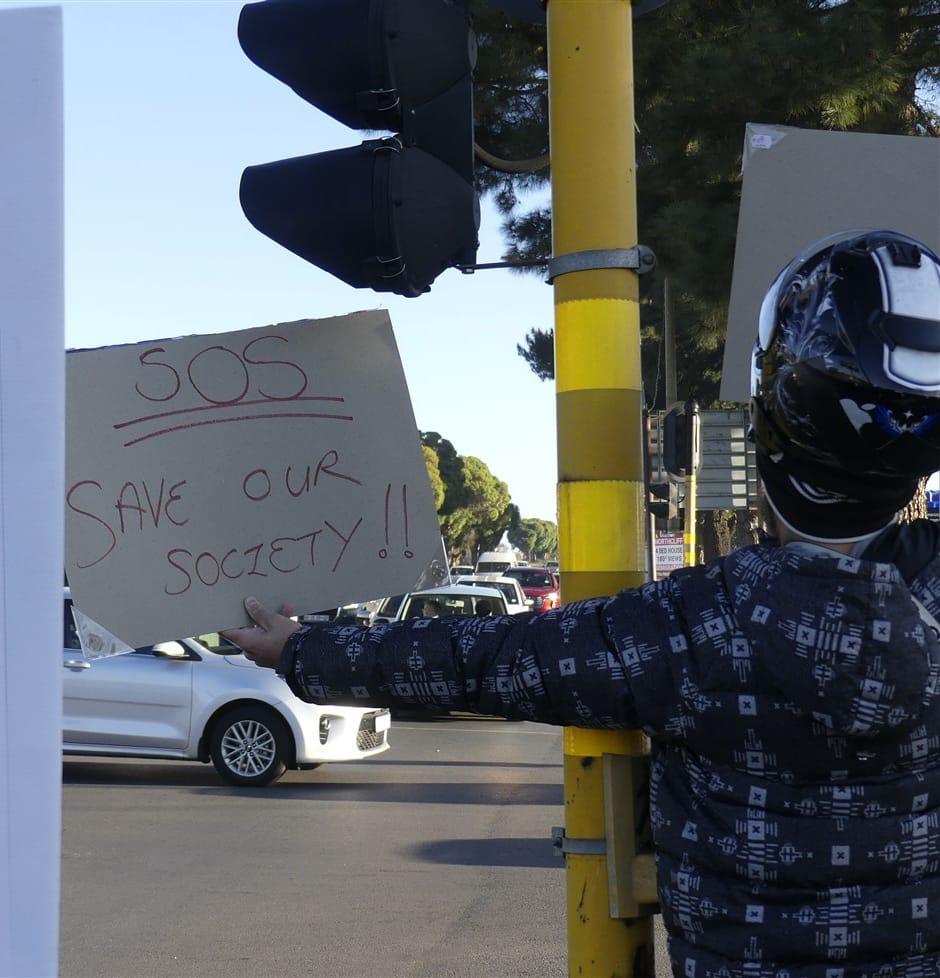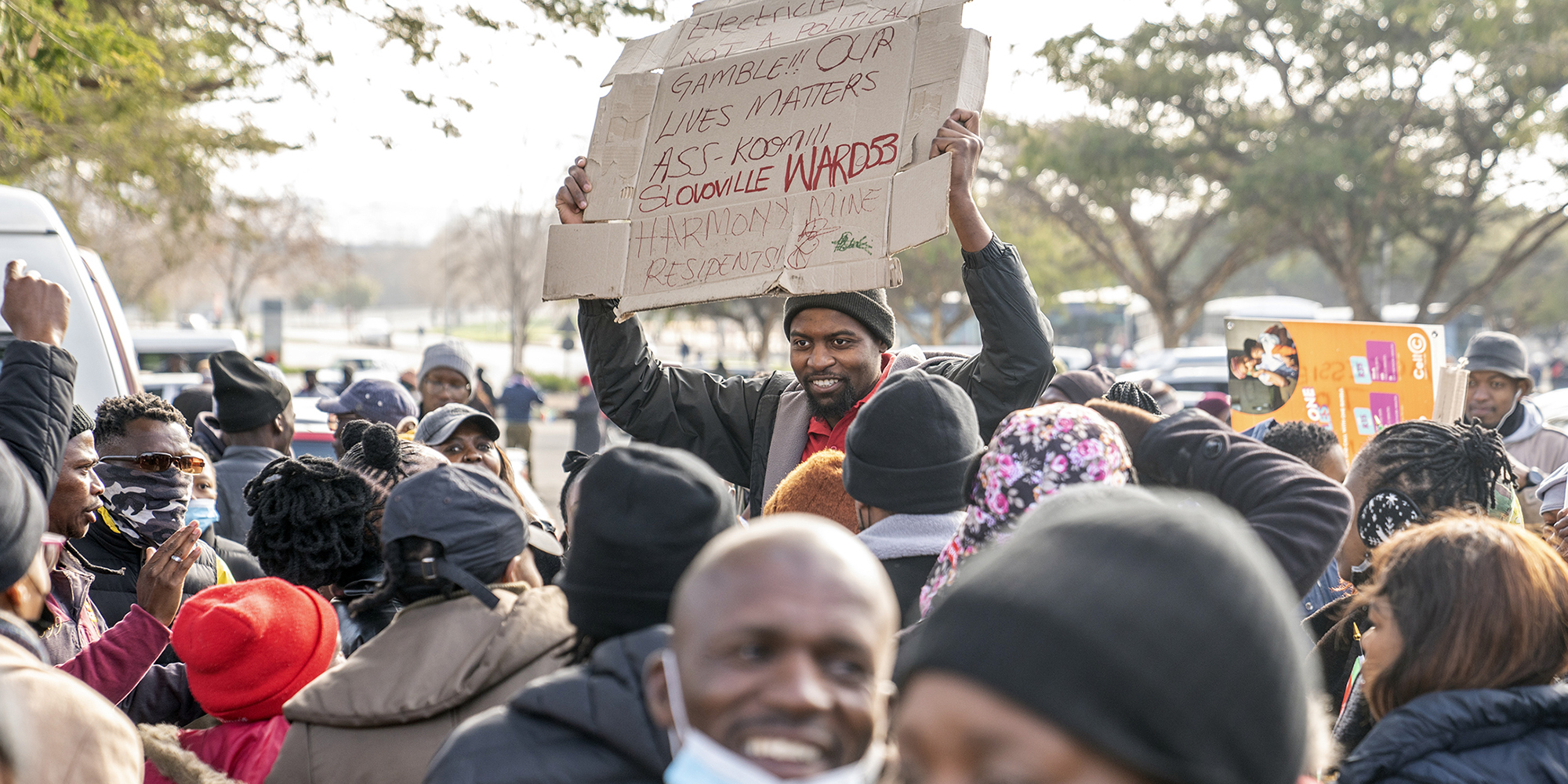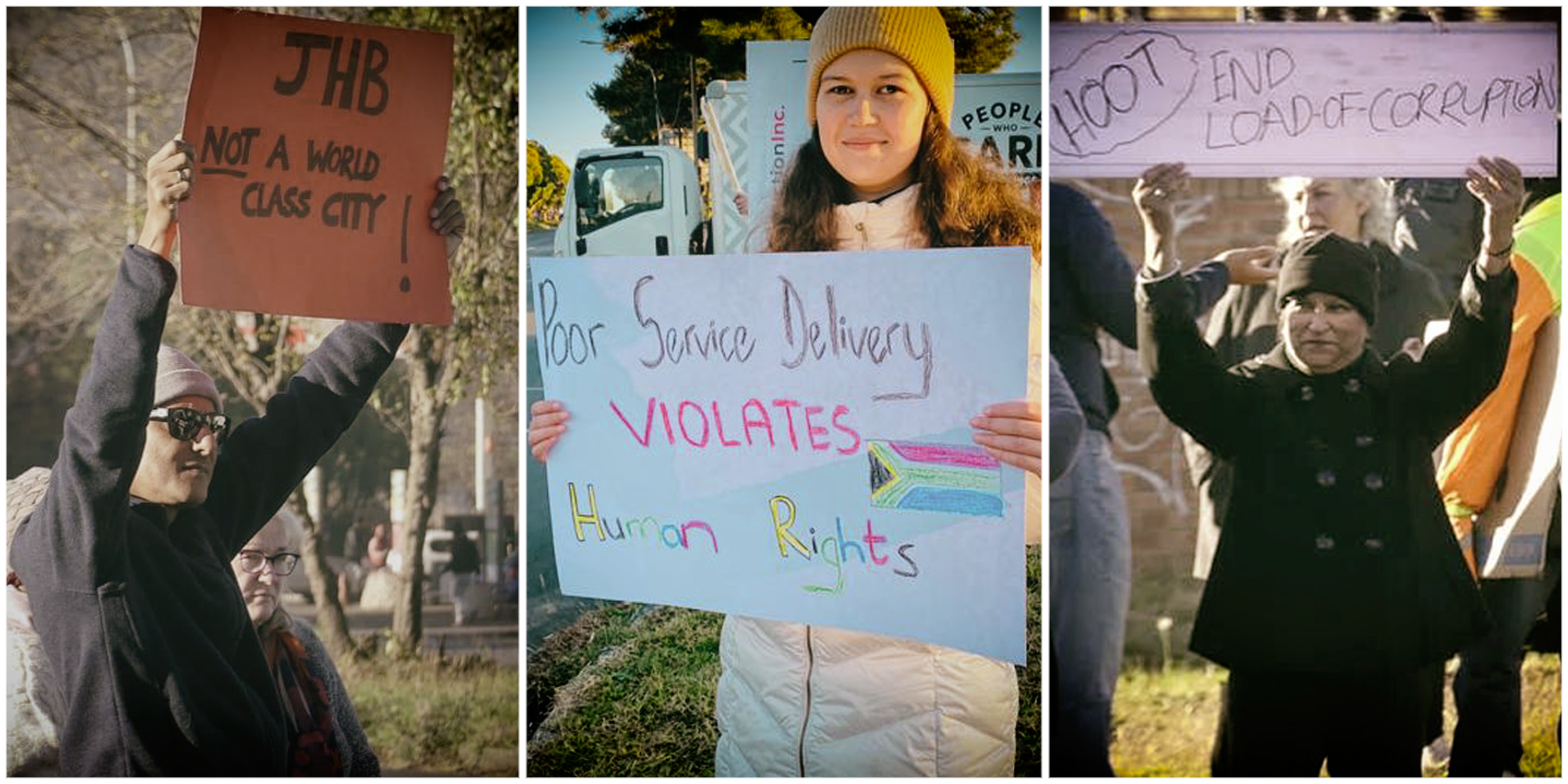‘Twelve, 18, 36 and 41 hours — there’s nothing under 12 hours,” says Abdul Kader Amod of Roosevelt Park in Johannesburg, the suburb near Westpark Cemetery that lies to the northwest of the city. He’s detailing average power cuts in the area for all of 2023.
Last Friday and again on Monday, residents of affected areas took to the streets to protest against the multiday outages that have become standard for them this year.
“Over and above load shedding — either there’s a trip, a cable gets burnt, or it is cable theft,” he said, adding that it feels like stages 8 or 9 power cuts. So, on Friday, residents who don’t usually take to the front lines protested in the early morning Highveld cold.
“Hoot if you’re gatvol,” a poster asked of motorists travelling the busy arterial route of Beyers Naude. There was a lot of hooting. They were out protesting again on Monday, 5 June.
 Johannesburg residents protest against multiday power cuts. (Photo: Supplied)
Johannesburg residents protest against multiday power cuts. (Photo: Supplied)
Multiday power cuts are now standard across Johannesburg’s north, east, west and southern suburbs and are the most burning issue with residents who contact Daily Maverick. City Power services 380,000 households and businesses out of a total of 1.4 million households in Johannesburg. Its grid needs a major overhaul that will cost tens of billions of rands, but decades of underinvestment and poor maintenance are coming home to roost.
City Power’s call centre logs 4,000 outages a day on average, says spokesperson Isaac Mangena, and its contractors are stretched.
“Our network is in a critical state, with the wear and tear increasing at a faster pace due to load shedding. We lose R3.6-million daily due to load shedding, most of it going to material needed, overtime for technicians, etcetera,” says Mangena.
 Johannesburg residents protest against multiday power cuts. (Photo: Supplied)
Johannesburg residents protest against multiday power cuts. (Photo: Supplied)
“Our network is buckling under, with more plants going out of service due to the relentlessness of load shedding. We are sitting with over 500 plants out of service and it’s 50 under normal circumstances.”
Winter burn
In winter, the city of six million people feels the Highveld chill and turns on heaters. When demand increases, so do outages, says Mangena, who adds that City Power is not in crisis. It’s not a view shared by its customers suffering increasingly extended power cuts. If national grid failure planning is for four to seven days without power, many Johannesburg residents get practice runs.
The former mayoral committee member for infrastructure, the DA’s Michael Sun, says that only 30% of City Power’s estimated 68 substations can be switched on and off remotely to comply with Eskom’s cut-off schedule. For the remaining 70%, technicians have to battle through load-shedding traffic snarls to turn them on and off manually. The constant cuts cause further outages, equating to multiple fractal grid failures across the city.
 Johannesburg residents protest against multiday power cuts. (Photo: Supplied)
Johannesburg residents protest against multiday power cuts. (Photo: Supplied)
Electricity protests are now so regular they hardly make the mass media, but are standard fare across social media. Soweto, Sandton and other significant pockets are Eskom clients and face similar issues. Grid failure is spoken of as an event, but Johannesburg shows it is a process. It’s not the fault of any one administration but of a more extended system failure that is the story of most infrastructure failing in South Africa.
Johannesburg was won and run by ANC governments from 1994 to 2016, when the DA took over, with a short stint since then by the ANC. Now Johannesburg is run by the tiny Al Jama-ah party as the ANC and EFF use the three major Gauteng cities as proxy negotiating fields for their 2024 alliance. The two Al Jama-ah candidates, Thapelo Amad and now Kabelo Gwamanda, are political entrepreneurs with few skills that modern executive mayors need to run complex developing country cities.
 A resident holds a placard reading, ‘Electricity is not a political gamble…’ outside Maponya Mall, Soweto, on 21 June 2022. (Photo: Shiraaz Mohamed)
A resident holds a placard reading, ‘Electricity is not a political gamble…’ outside Maponya Mall, Soweto, on 21 June 2022. (Photo: Shiraaz Mohamed)
This political experimentation with amateur politicians pushes Johannesburg, Tshwane and Ekurhuleni to micro-state failure quickly. The Johannesburg power crisis is one example; the deadly Hammankraal cholera outbreak is another. In December 2022, former mayor Mpho Phalatse asked for a load-shedding reprieve to help cope with the high number of outages.
Add contractor changes to the mix.
Last week, street WhatsApp groups (how citizens and residents now organise themselves and run their little local governments as governments fail them) were abuzz with messages that City Power had ditched all its contractors and things were about to worsen.
It seemed that way, with outages shooting up, but Mangena says that is not the case.
City Power has replaced outsourced contractors with 240 new technicians, taking the total to 400 with better skills, he says.
“Contractors are used for emergency work and as backup to internal resources. That has gone a long way in ensuring efficiency and reducing the exorbitant contractor costs. In 2021/22, we paid in excess of R800-million to the contractors,” says Mangena.
He says that by Monday morning (5 June), their outage calls had dropped from the 4,000 average to 3,000. Councillors say fewer contractors are on the ground than before the changes made on 1 June, but Mangena disputes this. He says City Power now works with eight major contractors, each of which subcontracts if needed, and it will add 65 new trained contractors “in a month or so”.
Sun said the overhaul of the contractor system was overdue: many old hands were challenging to manage and didn’t adhere to service standards.
 Johannesburg residents protest against multiday power cuts. (Photo: Supplied)
Johannesburg residents protest against multiday power cuts. (Photo: Supplied)
“Some cable repairs would be done, but the trenches dug were shallow and it was easy for thieves to get to,” said Sun.
Johannesburg is the epicentre of cable theft, and its traffic lights often lie prone at the side of intersections, their bottoms sliced open to retrieve the copper wiring. As the power crisis deepened, some contractors started asking desperate people left in the dark to pay them a little something — a form of local government rent extraction now standard in South Africa’s corruption pandemic.
“Many residents stood on the right side (and refused to pay), but some people encouraged it by contributing to a pool to pay the contractors,” says Sun.
The rejig under way is to ensure a better standard, says Mangena, who adds that City Power’s data show that power cuts are not much higher this year than they were in 2021 and 2022.
Communities are managing by helping one another. In Roosevelt Park, for example, there are three nursing homes and it’s difficult for elders to get around when the lights go out. Some neighbours with generators have created a roster to rotate their generators on loan to the homes. DM




 Johannesburg residents protest against multiday power cuts. (Photo: Supplied)
Johannesburg residents protest against multiday power cuts. (Photo: Supplied) 